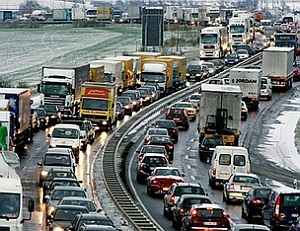
Germany implemented strict measures to check pollution caused by cars. Three German cities introduced legislation against the most-polluting cars on Tuesday, barring them from downtown districts marked as environmental zones. This green drive aims at reducing the average CO2 emission which is leading to climatic disorders and cause 75,000 premature deaths per year. According to the new system, carmakers would have to cut average emissions of CO2 from new passenger cars sold in the EU from about 160 grams per kilometre to an average 130 grams per kilometre in 2012. Also, parts and fuel-makers will be asked to upgrade gearboxes and air-conditioning systems, tyre-pressure monitoring and lean towards biofuels.
Vehicles like old diesel-engined cars that exceed the limit will be banned. The ban applies seven days a week. Under the EU proposals, carmakers that fail to meet carbon dioxide emission limits by 2012 will face initial warnings followed by fines. The city of Berlin said it would introduce fines of up to €40 (US$58.80) starting in February while Cologne wants to start handing out tickets only in April. Penalties will start in 2012 at 20 euros (£14.35; $28.80) per gram of CO2 over a target level, and will grow to 95 euros in 2015. All carmakers that sell vehicles in the 27-nation bloc would face fines if they exceed targets. Producers of larger and heavier cars will have to be extra careful. Berlin, Cologne and Hanover require drivers to fix special stickers to their cars showing that they fulfill new exhaust emission standards. About 20 other German Cities will follow suit. Foreign cars will be treated with leniency.
BBC’s European Business Reporter, Dominic Laurie, said:
Not every firm will have the same target – instead there’s a sliding scale that depends on how heavy their cars are. Makers of bigger vehicles will be allowed to pollute more – and lighter ones less. Makers of bigger cars can pool their total automobiles sold with other car companies making lower-emitting cars to meet the average 130 gram target.
Commission President Jose Manuel Barroso expressed his support for the venture. However, the proposal has triggered off a considerable amount of controversy and opposition from various sources. German Chancellor Angela Merkel labeled the proposal as ‘not economically favorable’, which would burden Germany and its carmakers disproportionately. BMW said the proposals were ‘naive’ steps that would distort the market in favor of makers of smaller cars.
Peugeot opined, “These plans are anti-ecological, anti-social, anti-economical and anti-competitive in relation to non-European Union carmakers.”
Sigrid de Vries, of the European Automobile Manufacturers body, added that fines would be ‘unprecedented’ and that industry wanted a realistic system with objectives it could meet, indicating that the penalties should have a clear link to the price of CO2 applied to other sectors.
Jos Dings, director of the pressure group Transport and Environment said:
If today’s proposal becomes law, it will boost the SUV arms race in Europe, rewarding carmakers for their climate-killing strategy of making ever heavier cars. In the long term this strategy will backfire meaning heavier cars, more CO2 emissions and more accident deaths.
Via: Yahoo! Green




